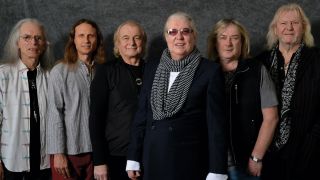When you got the call to work on Heaven & Earth, did you feel a mixture of excitement and trepidation about revisiting a dark scene?
No. There was a change of personnel, so it felt as though this could well be different. Plus they’re more mature now, and they seem to be more focused on the long-term repercussions of going “Boo!” to each other.
Was there any apologising when you met again in LA in January 2014?
Absolutely none. We did realise, though, that if things go wrong, it could be the end. But they’d already been there and done that.
How did working with Jon Davison compare to working with Jon Anderson?
You can’t compare them, really. They both come from completely different schools of thought. Jon Davison is definitely working very well in the band.
And what about Steve Howe? These days he comes across as the keeper of the Yes flame and strikes one as being rather hard to please. Is that true?
I had great sessions with Steve. Whatever’s in his brain comes out of his fingers – it’s the weirdest thing.
Instrumentally, would you say that Yes today are as good as any other band you’ve worked with?
Yes. Geoff [Downes]’s stuff was complex, Alan [White]’s stuff was powerful, and Chris [Squire] plays lead guitar bass!
Did you have a preliminary conversation about how the record should sound?
No. Everyone had their own opinions and voiced them to me, and as the producer I had to listen to them all and get a consensus.
Was it to make a melodic album? An accessible album? A Yes-like album?
My idea was to make it hefty, because everybody’s going hefty now. And I wanted great vocals.
Are you an auteur producer? If so, do you bring your mark to bear on a band’s sound?
I bring a lot of stuff to the making of any record. And then I have to use it in relation to my own aesthetic and merge it all. So yes, there are similarities with a lot of records I’ve produced, but I try not to take away from the band their own thing.
Did you revisit the huge Yes back catalogue for ideas and inspiration for Heaven & Hell?
I’ve been a fan since Roundabout, so I’ve been listening to their records through all the changes. But you have to start from scratch each time. You have to get the aesthetic that everybody knows so that when you put the record on for the first time, everyone knows it’s them. But you also want to make sure it’s relatively current.
Where does this one fit in the Yes scheme? Is it the 1979 album that should have been, a 90125 of a record, one that’s fit to stand alongside their classics?
A bit of each, I think. There are a couple of poppier Owner Of A Lonely Heart-type things, some Roundabout things recalling that phenomenal bass part… The Game and Believe Again are definitely my favourite tracks. There’s a good blend of the lengthy and the concise. There’s enough multipartite stuff to satisfy the diehards, but also more accessible stuff.
Is it like a compilation of the best of Yes?
That’s what we were going for, and I think we achieved it. The feeling among the band was that the band are too good not to have a big audience.
So there was an attempt to make a record that would reach out to as many people as possible?
Absolutely, yes.
Yes have a huge back catalogue, so where would you place this album in their pantheon?
Well, I’d have to say right at the top because I’m involved!
Did the experience of recording this album with the band help take away the unpleasant taste from the 1979 sessions?
I wouldn’t say so. It was more like continuing where we left off. There was less arguing than before.
And best of all, no one broke their foot…
That’s right! The only thing I said, whenever anyone got up to go to the loo, was, “Don’t leave it too long otherwise you’ll get slagged off!” That was one way of keeping them all in a room together


